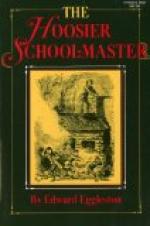Halliwell and Wright give dogon as a noun, and mark it Anglo-Norman, but they apparently know it only from Jamieson and the supplement to Jamieson, where dogguin is cited from Cotgrave as meaning “a filthie old curre,” and doguin from Roquefort, defined by “brutal, currish” [hargneux]. A word with the same orthography, doguin, is still used in French for puppy. It is of course a question whether the noun dogon and its French antecedents are connected with the American verb dog-on. It is easy to conceive that such an epithet as dogon might get itself mixed up with the word dog, and so become an imprecation. For instance, a servant in the family of a friend of mine in Indiana, wishing to resign her place before the return of some daughters of the house whom she had never seen, announced that she was going to leave “before them dog-on girls got home.” Here the word might have been the old epithet, or an abbreviated participle. Dogged is apparently a corruption of dog-on in the phrase “I’ll be dogged.” I prefer dog-on to dogone, because in the dialect the sense of setting a dog on is frequently present to the speaker, though far enough away from the primitive sense of the word; perhaps.]
CHAPTER II.
A SPELL COMING.
There was a moment of utter stillness; but the magnetism of Ralph’s eye was too much for Bill Means. The request was so polite, the master’s look was so innocent and yet so determined. Bill often wondered afterward that he had not “fit” rather than obeyed the request. But somehow he put the dog out. He was partly surprised, partly inveighed, partly awed into doing just what he had not intended to do. In the week that followed, Bill had to fight half a dozen boys for calling him “Puppy Means.” Bill said he wished he’d licked the master on the spot. ’Twould ‘a’ saved five fights out of the six.
And all that day and the next, the bulldog in the master’s eye was a terror to evil-doers. At the close of school on the second day Bud was heard to give it as his opinion that “the master wouldn’t be much in a tussle, but he had a heap of thunder and lightning in him.”
Did he inflict corporal punishment? inquires some philanthropic friend. Would you inflict corporal punishment if you were tiger-trainer in Van Amburgh’s happy family? But poor Ralph could never satisfy his constituency in this regard.
“Don’t believe he’ll do,” was Mr. Pete Jones’s comment to Mr. Means. “Don’t thrash enough. Boys won’t l’arn ’less you thrash ’em, says I. Leastways, mine won’t. Lay it on good is what I says to a master. Lay it on good. Don’t do no harm. Lickin’ and l’arnin’ goes together. No lickin’, no l’arnin’, says I. Lickin’ and l’arnin,’ lickin’ and larnin’, is the good ole way.”
And Mr. Jones, like some wiser people, was the more pleased with his formula that it had an alliterative sound. Nevertheless, Ralph was master from this time until the spelling-school came. If only it had not been for that spelling-school! Many and many a time after the night of the fatal spelling-school Ralph used to say, “If only it had not been for that spelling-school!”




